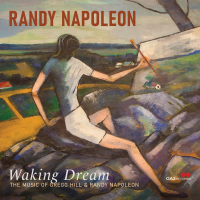Home » Jazz Articles » Interview » Matthew Shipp: Let's Do Lunch!
Matthew Shipp: Let's Do Lunch!

I play for myself; the act of playing is like a prayer or a meditation to me.
—Matthew Shipp
Here, we talk of the history of his musicianship; creative process; spirituality; interest in literature and life in New York City. I am blessed to have known him on many levels for such a long time.
Hope you'll enjoy the following interview as much as we did.
All About Jazz: Poet

Steve Dalachinsky
poet / spoken word1946 - 2019
Most of all, Steve and I have been big fans of your music. We've been following you around; rarely have we missed a chance to see you play since you started your career in the city. I wonder how many times we've seen you play in various formations and in different venues over the years. It's been wonderful to be able to witness every detail of your development as a musician and as a human being.
The first question I'd like to ask you is on the genesis of your creative life. You told me you started it very young, at the age of five or six. Do you recall any of the earliest episodes or moments that gave you a confirmation for the path you would take as a musician? What were your teenage days like? What kind of music did you listen to besides jazz then? You mentioned that your mother knew

Clifford Brown
trumpetb.1930
Matthew Shipp: The genesis of one's creative life is a labyrinth that is very hard to unravel. Often looking back, you see a pattern or how the pieces fell together, although at the time you were dealing with instinct and impulses without knowledge about how the pieces would cohere. I am talking in very broad metaphysical terms because I don't think there is much to gain with telling anyone the nuts and bolts of my musical development. The psychological journey is more important than the actual bricks and mortar.
One can practice the same things

Art Tatum
piano1909 - 1956

Bill Evans
piano1929 - 1980

Sun Ra
piano1914 - 1993
AAJ: Then you moved to Boston to study and eventually moved to New York City, where you encountered various creative beings such as

William Parker
bassb.1952
MS: I lived in Boston for a year before I moved to New York City, but moving to the city in 1983 was an act of liberation for me. My musical personality was formed when I moved here although I had a style of my own that had already started to unfold. So, it was not a matter of finding myself, but it was a matter of driving deeper and deeper into the underground stream that is me or the not me that becomes me.
New York was so open in the early '80s and I felt socially at home like nowhere else I had ever been. I was made to live in New York and I was able to find friends and people to work here the second I arrived. I was hanging out in the circle of artists like Jean-Michel Basquiat in my early days in the city and I was a fixture also as a dancer in the New York club scene. I don't know where I got the energy. I was practicing piano a lot, working a day job for the first seven years and hanging out at dance and jazz clubs. There is some dynamic of form and content as to who I am and what it means to be a contemporary artist at this time in history. New York reflects in my work and life even for someone whose music is as interior to me as it is. You can't help but be influenced by the energy and rhythm of this city.
AAJ: You spent admirable years being part of ensembles of two great master musicians:
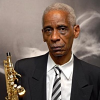
Roscoe Mitchell
saxophoneb.1940

David S. Ware
saxophone, tenor1949 - 2012
MS: My two highest profile gigs as a sideman were with David S. Ware and with Roscoe Mitchell. When I moved to New York at the age of 22, I was not thinking in terms of sideman gigs. I had my own world going and pretty much wanted to swim in that. I was doing duos with an alto great,

Rob Brown
saxophone, altob.1962
I had admired Roscoe since I was a teen and I went after him.
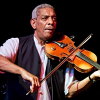
Billy Bang
violin1947 - 2011
AAJ: The word "jazz" is commonly accepted as the terminology for the kind of music you are involved in. What do you think of the word "jazz"? Do you accept it as a norm? What about the term "free jazz"?
MS: I don't know if I am a jazz player or what jazz is. I really don't give a fuck about jazz even though I love most of the historical people you would consider jazz artists. It's just a word to me. It's functional. I have yet to ever be able to locate the jazz in what people call jazz. I think in terms of universal vibration. I intercept universal vibration and pulse. If I am in public and someone asks me what I do for a living, it's not easy to say that I intercept universal vibration and pulse and translate that to lyrical phrases on the piano. It is just easier to say I am a jazz musician. But what I do is to intercept universal vibration and translate it to lyrical phrases on the piano. If it happens to fall into what people call jazz, then so be it. The clothes are the universal vibrations; the hangers the clothes are hung on is sometimes what people in the English language refer to as jazz. I am just digging into a deep language pool or field that the gods have given me to partake in. I have no reason why I've been given this language system. Nor do I give a fuck. It's just what I do.
AAJ: Jazz is an universal music born out of American soil, spirit and history as Haiku is an universal literature born out of Japan. People all over the world listen to and play this music as they do the same with Haiku writing in every language. America should be proud of this art form and it should be treated with the utmost love and respect. But in reality, jazz is still extremely marginalized in the society. Your thought on this?
MS: I try not to dwell on the marginalization of jazz in the society. I try to keep focused on my musical role in this period. But, if the gods declare that jazz is marginalized in this period, then, that is what it is. Of course, like any artist, I want as big an audience as I can get, but I have to do what I have to do. The notes I have to push down on the instrument are more important than fitting into any idea of what's cool or what should be consumed by society at large. In other words I don't give a fuck. I am lucky to have such a clear focus on a path that has opened up. By virtue of having a pure path that beckons, the other questions should never even concern me. They do and don't. I think the music has a lot to offer, but people would rather eat food that will kill them than healthy food. That's a fact and I accept it. I have people who get something out of my work and want to hear it. I feel very lucky to know that there are people who are interested and get something out of what I do.
I play for myself; the act of playing is like a prayer or a meditation to me. I play for the people who do resonate with my language. Of course, I want to expand the audience. Of course, I would love jazz to have a much bigger market share and place within the general culture. But, at the end of the day, my job is to play myself on my instrument; everything else is beyond my control. So why worry about it? I don't need a million people to validate what I do. I would do it if no one listened, but, thank goodness, I do have an audience. As long as I know I have something to offer to the people who do listen to me, I feel like leaving all the macro issues about the jazz business/art form for others to ponder though I am aware of the issues.
AAJ: As an artist and a writer, I always feel like I am a small part of the grand flow of human consciousness that moves from the past to the present and further to the future. Each individual artist is given a limited time/space to explore what she or he is involved in while alive. I remember that you expressed a similar feeling. Can you talk of your creative linage or a family tree, not just in jazz, but in a big river of the human history of music?
MS: Like any artist, I am just one small part of a big flow and picture. I feel like I come out of many flows and traditions and I also feel like my language is something that can only exist now, whatever now is. In one way, I did evolve out of language systems that existed before me. I can be seen as an outgrowth of '60s piano,
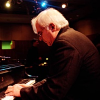
Paul Bley
piano1932 - 2016

Andrew Hill
piano1931 - 2007

Cecil Taylor
piano1929 - 2018

McCoy Tyner
piano1938 - 2020

Bud Powell
piano1924 - 1966

Thelonious Monk
piano1917 - 1982

Mal Waldron
piano1925 - 2002

Randy Weston
piano1926 - 2018

Duke Ellington
piano1899 - 1974
But, at the end of the day, the music is vibration. Though it seems to evolve through some type of historical extension, it also could have cohered as vibration out of the big bang in exactly the form it is in without history. It is all fields of energy-vibration and information. I become the field when I play. I translate the field and become the field. It is all flow by virtue of being and being in the universe because, in one way, the whole universe is one chip of information that takes millions of forms. You, in some ways, have no choice but to be in the flow. Of course, intention of some sort determines the flow you choose to embody.
AAJ: In Matthew Shipp Appreciation, I related who you are to one of the essential segments in the writing of Wassily Kandinsky's Concerning The Spiritual in Art. Throughout the history, from the cave days to the present, in every field, creativity goes hand in hand with a spiritual quest of some kind one way or the other if its impetus is genuine. Of course, how it manifests varies in such a way. I remember one of your favorite books is Paramahansa Yogananda's Autobiography Of a Yogi. You said "I play for myself—the act of playing is like a prayer or a meditation to me," and when you were young, you even thought of pursuing a career of being a priest. I'm always aware of the constant presence of a deeply devotional "spirit(ual)-energy" in your music. Do you believe in spirituality? Or what is spirituality to you?
MS: Spirituality within the music is all I am about as far as the music goes. I am a language systems generator, a logos ejaculator. Music is always a quest to understand the expansion of cosmos from nothingness. It deals with the eternal expansion of the word-DNA seeding of cosmic growth, angelic syntax and mind fields. I do not practice any particular religion. But, since I grew up Christian, Christian iconography is part and parcel of my subconscious. I have kind of created my own Gnosticism, not unlike Philip K. Dick created his own Gnosticism. Angels are energy forms or photons of light, so I talk to angels and they give me the syntax. I see my phrasing as a natural extension of whatever speech the angel puts in my ear.
The mass and the Eucharist were a big part of my childhood; I was fascinated by the idea of the transubstantiation. I used to steal wafers from the church and performed the mass at home on a homemade altar—I was an altar boy and had the mass memorized by the time I was six. It was like a science experiment to me. I was trying to figure out at exactly what time in the ritual the bread and wine became the body and blood of Christ. This alchemic idea that I have been exploring since early childhood really informs my music. And it all goes into pulse and language for the whole cosmos in a language form and the music just mirrors the structure of the Cosmos. I deal with lights and darks not unlike Yin and Yang. There is a process in the music where the Tao, which is beyond comprehension or conceptualization, filters down in some mysterious way and takes form. Hope that answers the question.
AAJ: You practice everyday although you do not have a piano. I more than once called you a "have-not" artist. I am a "have-not" artist as well since I do not have a studio space. So is Steve since he does not have a study. We struggle with the shortcoming of our "have-not" circumstances and conditions one way or the other. But I think how we survive as creative beings despite the difficulties we face is very "political." Can you talk of your daily practice routine?
MS: You are right. I do not have a piano in my apartment. I have a place in midtown where I practice and I try to get there as often as possible. But a life in New York City is complicated and tough, so I do not get the practice time I did as a kid. As a kid-teen and an early adult, I might have been one of the all-time practicers in the world history. One day I sat at a piano for 10 hours without getting up to even use the bathroom. As an adult with the complexities of life, I can't do anything like that anymore and often miss days.
But since I have to go somewhere else to do it, I have to be very focused and structured about my practice time and what I get done. I am an expert at that by this point. I try to get to the studio as often as I can. But at this point, the language is embedded in my psyche at a very deep level and it's a matter of keeping the correct channels open rather than of a physical practice. My piano is at my Dad's house in Delaware. I often visit him and when I do, I get a lot of work done. It's a matter of getting out of bed and going to the basement instead of walking to midtown as I do in New York City. But walking to midtown, I get a physical exercise. The whole thing is holistic.
AAJ: Naturally, your life is focused intensely on music. But, interestingly, you are one of the rare musicians whose personal life and human relationship are never "music-centric." Sadly, a genre-segregation among creative beings is obvious. Artists flock together with artists; musicians with musicians; writers with writers and so on. Contrarily, you enjoy rich and diverse friendships with many artists and friends crossing the genre borders. The late Lester Afflick, a poet, was your best friend. The late John Farris, also a poet, was another good friend of yours. Kevin Jordan studied films. Paul Beatty, a writer, is another friend you cherish. I met Christine Hughes, a painter, through you. Also, your wide range of interests in culture that goes from boxing to literature always fascinates me.
You frequently talk of writers such as Emerson, Genet and Borges as your guiding spirits. You inspired me to read Emerson. You did two great Genet projects with your quartet Declared Enemy: Salute to 100001 Stars—A Tribute to Jean Genet (RogueArt, 2006) and Our Lady of the Flowers (RogueArt, 2015). Can you talk of how they've affected you and your life?
MS: I have a lot of interests, but most artists I know have a whole cross range of interests. With

Ran Blake
pianob.1935

Bill Dixon
trumpet1925 - 2010
As far as writers go, I could go on and on about how different people have influenced what my idea of being an artist is about. Early on, I would say, I was really really taken by Henry Miller. It was his take of no prisoners attitude; an extreme commitment to doing it his way; his "I don't give a fuck" attitude; his complete rejection of society; his spirituality which owes nothing to any linage even though he was very erudite about everything and tradition and which in some ways ended up being sort of Krishnamurti's synthesis or some peculiar form of American Zen. He welded the physical and sensual with the psychological and the spiritual expressing his cosmic poetics as one of his heroes Whitman did. I like him because I like American decadent motherfuckers.
Emerson in some ways is the American religion. Yes, he is a major touchstone for me in many many ways. Genet inverted Christian symbology with his deep imagination and that type of alchemic imagination is very close to mine. I wrote about this in the liner notes for the CD Declared Enemy. His novel Our Lady of the Flowers was a big one for me.
Also, Osho, known as Bhagwan Shree Rajneesh, made an early impact on me. I know he is very controversial and insane to some extent and I am aware of his excesses. But he might have been one of the purest rebels. He rejected every tradition. He was against everything; made fun of everything; nothing was sacred to him. Yet, all is sacred to him in its pure essence. Whitman would never go as far to be that dangerous. One can even think Osho is full of shit and some do think he is pure evil, whatever that is, but he embodies a poetic spirit of a pure rebel as much as anyone aspires to be.
I also have practiced Kundalini Yoga and a guru who was around in the early 1960s, Bhagawan Nityananda of Ganeshpuri, made a big impact on me. He was a saint who spent most of his life in silence; never preached; didn't write, although there is one book of a few sayings of his although he rarely spoke. He spent most of his life in a deep trance and was able to dispense Kundalini energy by touch or a look.
AAJ: Baroness Pannonica de Koenigwarter, a patron Saint of jazz who took care of

Charlie Parker
saxophone, alto1920 - 1955

Thelonious Monk
piano1917 - 1982

Coleman Hawkins
saxophone, tenor1904 - 1969

Miles Davis
trumpet1926 - 1991

John Coltrane
saxophone1926 - 1967

Charles Mingus
bass, acoustic1922 - 1979

Eric Dolphy
woodwinds1928 - 1964

Sonny Rollins
saxophoneb.1930

Elvin Jones
drums1927 - 2004

Ornette Coleman
saxophone, alto1930 - 2015
MS: First, racial and ethnic prejudices seem to be such a deep and entrenched part of being human. We are all affected by it and it is a disease. I wish humans could figure out a way to confront and transcend it.
Second, greed seems to get in the way of good things developing. I wish humans could figure out a way to create a more humane life not based on having to acquire more, then, some more and then, some more and more.
Third, I wish to see deeper into the abyss as I go along.
AAJ: Thank you, Matt! Our lunch is overdue. Let's have one very soon!
Photo Credit: Barbara Januszkiewicz
Tags
Matthew Shipp
Interview
Yuko Otomo
New York City
Steve Dalachinsky
Clifford Brown
Art Tatum
Bill Evans
Sun Ra
Boston
William Parker
Roscoe Mitchell
David S. Ware
Rob Brown
Billy Bang
Paul Bley
Andrew Hill
Cecil Taylor
McCoy Tyner
Bud Powell
Thelonious Monk
Mal Waldron
Randy Weston
duke ellington
Ran Blake
Bill Dixon
Charlie Parker
Coleman Hawkins
Miles Davis
John Coltrane
Charles Mingus
Dolphy
Sonny Rollins
Elvin Jones
Ornette Coleman
Comments
PREVIOUS / NEXT
Support All About Jazz
 All About Jazz has been a pillar of jazz since 1995, championing it as an art form and, more importantly, supporting the musicians who make it. Our enduring commitment has made "AAJ" one of the most culturally important websites of its kind, read by hundreds of thousands of fans, musicians and industry figures every month.
All About Jazz has been a pillar of jazz since 1995, championing it as an art form and, more importantly, supporting the musicians who make it. Our enduring commitment has made "AAJ" one of the most culturally important websites of its kind, read by hundreds of thousands of fans, musicians and industry figures every month.

.jpg)

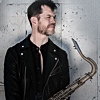
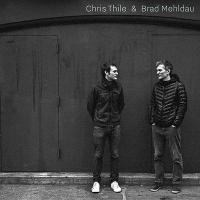

 Buy Now
Buy Now



